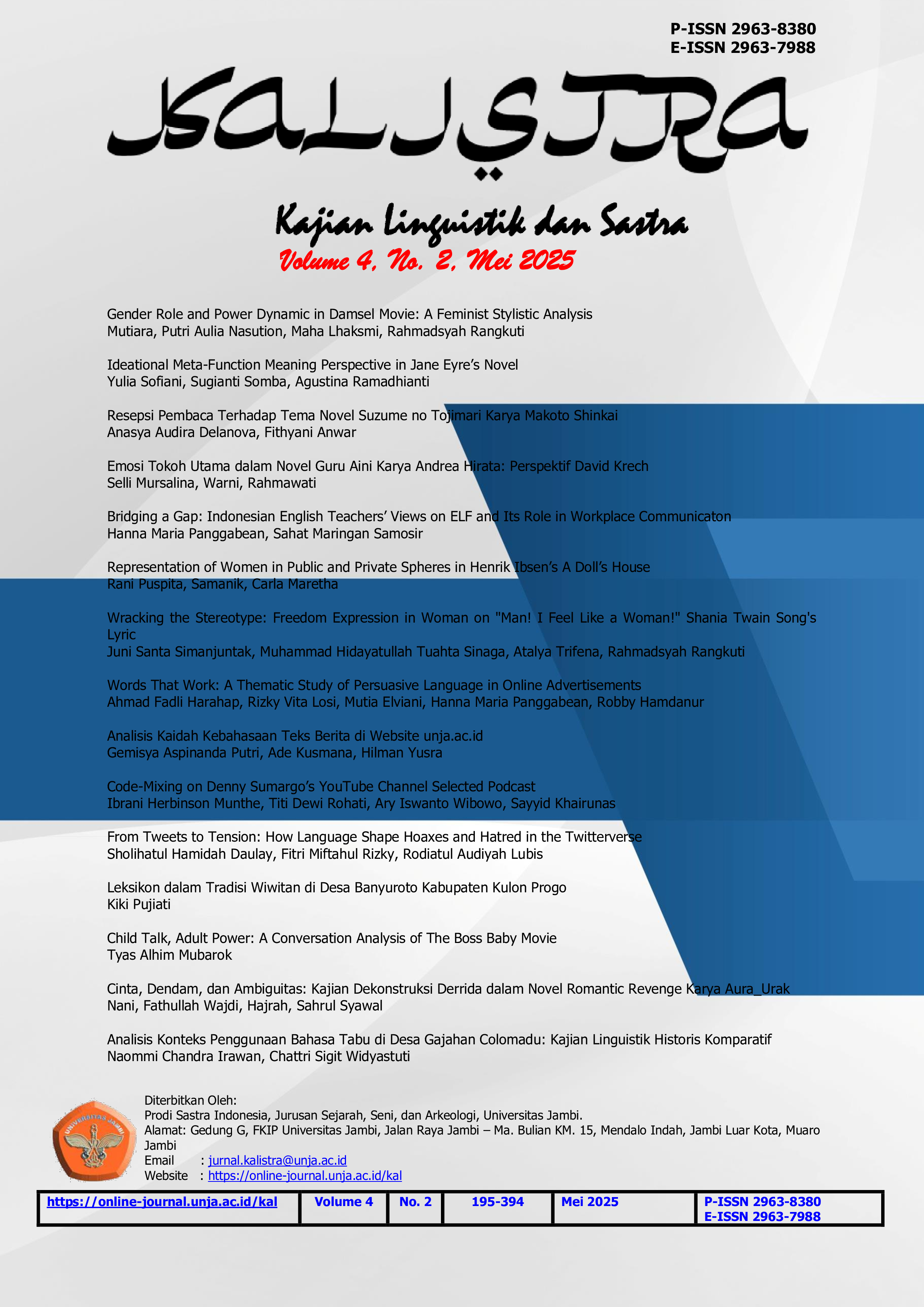Cinta, Dendam, dan Ambiguitas: Kajian Dekonstruksi Derrida dalam Novel Romantic Revenge Karya Aura_Urak
DOI:
https://doi.org/10.22437/kalistra.v4i2.44265Keywords:
dekonstruksi, novel, sastraAbstract
This article discusses the fragmentation of meaning in Aura_Urak's novel Romantic Revenge through Jacques Derrida's deconstruction approach. This study is motivated by the complexity of the relationship between love and revenge in literary texts that are laden with ambiguity of meaning. The research aims to reveal the instability of meaning in the love narrative presented, as well as how these meanings are always deferred, fragmented, and open to multiple interpretations. The method used is textual analysis with a post-structuralist approach, referring to Derrida's theory of deconstruction and Roland Barthes' concept of the death of the author. The findings reveal that the novel presents a non-linear dynamic of meaning, where love does not appear as a singular concept but as a fragile, contradictory, and context-dependent emotional experience. Thus, readers play a central role in shaping and negotiating the meaning of the ambiguous and paradoxical narrative.
Abstrak
Artikel ini membahas fragmentasi makna dalam novel Romantic Revenge karya Aura_Urak melalui pendekatan dekonstruksi Jacques Derrida. Kajian ini dilatarbelakangi oleh kompleksitas relasi cinta dan dendam dalam teks sastra yang sarat ambiguitas makna. Penelitian bertujuan mengungkap ketidakstabilan makna dalam narasi cinta yang ditampilkan, serta bagaimana makna-makna tersebut selalu tertunda, terpecah, dan terbuka terhadap interpretasi jamak. Metode yang digunakan adalah analisis tekstual dengan pendekatan post-strukturalisme, mengacu pada teori dekonstruksi Derrida dan konsep kematian pengarang Roland Barthes. Hasil kajian menunjukkan bahwa novel ini menyuguhkan dinamika makna yang tidak linier, di mana cinta tidak tampil sebagai konsep tunggal melainkan sebagai pengalaman emosional yang rapuh, kontradiktif, dan tergantung pada perspektif pembaca. Dengan demikian, pembaca memainkan peran sentral dalam membentuk dan menegosiasikan makna dari narasi yang ambigu dan penuh paradoks.
Downloads
References
A. Callinicos. (2024). Marxism and the International. The British Journal of Politics & International Relations, vol. 6, no. 3, pp. 426–433, Aug. 2004, doi: 10.1111/J.1467-856X.2004.00148.X.
Ahyar. Juni. (2019). Apa Itu Sastra: Jenis-Jenis Karya Sastra dan Bagaimanakah Cara Penulisan dan Mengapresiasi Sastra. Yogyakarta: Deepublish.
Altiria, Seradona. (2023). Dekonstruksi Derrida Pada Kajian Linguistik Kognitif. Konferensi Linguistik Tahunan Atma Jaya 21. Unika Atma Jaya, 20−22 Juni
Aura_Urak. (2025). Romantic Revenge (novel online). Diakses pada hari Senin tanggal 7 April 2025.
B. Hardiman. (2015). Seni Memahami. Yogyakarta: Kanisius.
Benjamin. (2013). “Deconstruction,” in The Routledge Companion to Critical and Cultural Theory, Second., S. Malpas and P. Wake, Eds., Oxon: Routledge.
Constantin, Natasha. Fitzerald Kennedy Sitorus. (2023). Dekonstruksi, Makna dan Bahasa dalam Perspektif Jacques Derrida. Jurnal Ilmu Komunikasi dan Media Sosial. 3(3). 795-801.
E. Ariwidodo. (2013). Logosentrisme Jacques Derrida dalam Filsafat Bahasa. KARSA: Journal of Social and Islamic Culture, vol. 21, no. 2, p. 340, Dec. 2013, doi: 10.19105/karsa.v21i2.38.
Fajria R, Hasina. (2024). Dekonstruksi dalam Novel Laskar Pelangi. Balai Bahasa Ujung Pandang. Vol. 17(3). 335-346.
G. P. Hendricks and G. Hendricks. (2016) Deconstruction the end of writing: ‘Everything is a text, there is nothing outside context. Verbum et Ecclesia, vol. 37, no. 1, pp. 1–9, Oct. 2016, doi: 10.4102/VE.V37I1.1509.
Gnanasekaran, R. (2015). An Introduction to Derrida, Deconstruction and Post-Structuralism. International Journal of English Literature and Culture, 3(7), 211-214.
Haslinda. (2019). Teori Sastra: Memahami Genre Puisi, Prosa Fiksi, dan Drama/Teater. Makassar: LPP Unismuh Makassar.
J. Derrida. (1978). Writing and Difference. Routledge.
Kartikasari HS, Apri. Edy Suprapto. 2018. Kajian Kesusastraan: Sebuah Pengantar. Magetan: CV. AE Media Grafika.
Kosasih E. (2011). Ketatabahasaan dan Kesusastraan. Bandung: Yrama Widya.
Sugiono. (2015). Metode Penelitian Pendidikan.: Pendekatan Kuantitatif, Kualitatif, dan R&D. Bandung: Alfabeta.
Widyaswara, Tiara. Riya Risqi Setyaningrum. Dian Luthfiyati. (2021). Analisis Dekonstruksi dalam Novel Laut Bercerita Karya Leila S Chudori. Jurnal Prosiding Seminar Nasional Linguistik dan Sastra. ISBN 978-602-5872-78-5.
Downloads
Published
How to Cite
Issue
Section
License
Copyright (c) 2025 Nani Nani, Fathullah Wajdi, Hajrah Hajrah, Sahrul Syawal

This work is licensed under a Creative Commons Attribution-ShareAlike 4.0 International License.
Kalistra: Kajian Linguistik dan Sastra is licensed under Creative Commons Attribution-ShareAlike 4.0 International License.
Authors who publish their manuscripts in Kajian Linguistik dan Sastra agree to the following terms:
1. The copyright in each article belongs to the author.
2. The author acknowledges that Kajian Linguistik dan Sastra reserves the right to be the first to publish under a Creative Commons Attribution-ShareAlike 4.0 International License (Attribution 4.0 International CC BY-SA 4.0).
3. Authors may submit articles separately, arranging for non-exclusive distribution of manuscripts that have been published in this journal to other versions (e.g., delivery to the author's institutional repository, publication into a book, etc.), acknowledging that the manuscript has been first published in Kajian Linguistik dan Sastra.
















